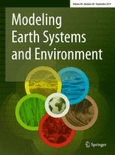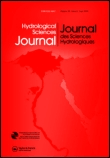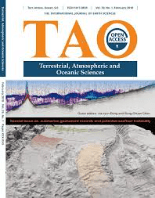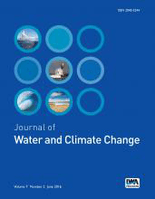
Modeling Earth Systems and Environment
Scope & Guideline
Empowering knowledge dissemination in environmental modeling.
Introduction
Aims and Scopes
- Environmental Modeling:
The journal emphasizes the development and application of models to simulate environmental processes, including hydrological, climatic, and ecological systems. This involves both traditional and advanced modeling techniques, such as machine learning and statistical methods. - Ecosystem Dynamics:
Research often explores the dynamics of ecosystems, including the impact of climate change on biodiversity, land use changes, and the resilience of ecosystems under various stressors. - Hydrological Processes:
Hydrological modeling is a core area, with studies focusing on water resource management, flood prediction, and the effects of land use changes on hydrology, utilizing models like SWAT and HEC-RAS. - Epidemiological Modeling:
The journal features epidemiological modeling, particularly in relation to infectious diseases, analyzing the dynamics of disease spread, control strategies, and public health implications. - Geospatial Analysis:
Research includes the use of geospatial techniques and remote sensing data for analyzing environmental changes, land cover dynamics, and resource assessments, often employing GIS in conjunction with various modeling approaches. - Climate Change Assessment:
The journal addresses the impacts of climate change through modeling studies that assess future climate scenarios and their effects on ecosystems, hydrology, and human settlements.
Trending and Emerging
- Machine Learning Applications:
There is a significant increase in the application of machine learning techniques for environmental modeling, particularly in predicting complex phenomena such as climate impacts, pollution levels, and land use changes. - Integrated Modeling Approaches:
Research increasingly emphasizes integrated modeling approaches that combine multiple disciplines and methodologies, such as coupling hydrological models with geospatial data and socio-economic factors. - Climate Change Impact Studies:
A growing number of studies are focused on the impacts of climate change on various ecological and hydrological systems, assessing future scenarios and adaptation strategies. - Urban Environmental Dynamics:
Research on urban environments, particularly related to urban heat islands, land use changes, and sustainability practices, is gaining traction as cities face increasing environmental challenges. - Epidemiological Modeling in Environmental Contexts:
The integration of epidemiological models with environmental factors is emerging, particularly in the wake of global health crises, highlighting the interplay between human health and environmental conditions.
Declining or Waning
- Traditional Statistical Methods:
There is a noticeable decline in the publication of studies relying solely on traditional statistical methods for environmental analysis, as there is a growing preference for machine learning and hybrid approaches that offer greater predictive power. - Basic Hydrology without Advanced Techniques:
Research that focuses on basic hydrological assessments without incorporating advanced modeling techniques or integrative approaches is becoming less frequent, as the field increasingly values sophisticated modeling frameworks. - Generalized Environmental Assessments:
Papers presenting generalized environmental assessments without specific applications or case studies are declining, reflecting a trend toward more targeted and context-specific research.
Similar Journals

Frontiers of Earth Science
Innovating Insights into Our Planet's SystemsFrontiers of Earth Science is a prominent academic journal in the field of Earth and Planetary Sciences, published by Springer. With an ISSN of 2095-0195 and an E-ISSN of 2095-0209, this journal serves as a significant platform for researchers and professionals to disseminate their findings from 2007 to 2024. It is recognized for its impactful contributions within the category of Earth and Planetary Sciences, boasting a respected Q2 ranking in 2023. With a Scopus ranking of 64 out of 195, placing it in the 67th percentile, Frontiers of Earth Science continues to drive academic dialogue and innovation. The journal is dedicated to exploring a diverse range of topics, including geology, meteorology, and environmental science, and amplifying the understanding of Earth systems through rigorous research. Located in New York, USA, this journal embraces an Open Access model, ensuring that groundbreaking research is readily available to the global scientific community, thereby enhancing its accessibility and impact.

Earth Science Informatics
Exploring New Frontiers in Earth and Planetary Research.Earth Science Informatics, published by SPRINGER HEIDELBERG, serves as a premier platform for disseminating innovative research in the realm of Earth and Planetary Sciences. With an ISSN of 1865-0473 and an E-ISSN of 1865-0481, this journal offers insightful contributions that leverage informatics and data-driven approaches to address complex geoscientific challenges. As a testament to its impact in the field, it ranks in the Q2 quartile and holds an impressive 73rd percentile rank among 195 journals in the broader **Earth and Planetary Sciences** category, as per Scopus rankings. This journal invites researchers, professionals, and students to explore and contribute to the growing body of knowledge that bridges the gap between informatics and Earth science, fostering advancements in both theoretical frameworks and practical applications. Situated in Germany, at TIERGARTENSTRASSE 17, D-69121 HEIDELBERG, it aims to enhance interdisciplinary collaboration and propel scientific discovery from 2009 to 2024 and beyond, reinforcing its vital role in the academic community.

Hydrological Sciences Journal
Unveiling insights into hydrological challenges and solutions.Hydrological Sciences Journal, published by Taylor & Francis Ltd, is a leading peer-reviewed publication dedicated to advancing the field of hydrology, spanning topics from water management to climate impacts on hydrological systems. With an impressive impact factor and a noted Q1 category ranking in Water Science and Technology, the journal occupies a pivotal role in the academic landscape, facilitating high-quality research dissemination since its inception in 1982. The journal is indexed in Scopus, holding a commendable rank of #48 out of 261 in the Environmental Science category, placing it in the 81st percentile among its peers. Although it does not offer Open Access options, the journal ensures extensive reach and readership through institutional subscriptions. As it converges toward its milestone of 2024, the Hydrological Sciences Journal remains an indispensable resource for researchers, professionals, and students eager to explore the latest advancements and methodologies in hydrological research.

EARTH
Pioneering discoveries in Earth and Environmental Sciences.EARTH is a prestigious journal published by MDPI, located in Switzerland, with a commitment to advancing the fields of Earth and Planetary Sciences and Environmental Science. Launched in 2020, the journal emphasizes an open-access publication model, ensuring that high-quality research is widely accessible to the scientific community and beyond. As of 2023, it proudly holds a Q2 ranking in both the Environmental Science and Earth and Planetary Sciences categories, indicating its significant impact within these disciplines; it ranks #90 out of 219 and #70 out of 159 in their respective fields according to Scopus. With the convergence of multidisciplinary research and the critical challenges our planet faces, EARTH seeks to publish innovative studies that foster a deeper understanding of geological and environmental processes. Researchers, professionals, and students alike will find this journal an invaluable resource for the latest findings and discussions shaping our understanding of Earth sciences.

TERRESTRIAL ATMOSPHERIC AND OCEANIC SCIENCES
Transforming Insights into Actionable KnowledgeTERRESTRIAL ATMOSPHERIC AND OCEANIC SCIENCES, published by SpringerNature, is a distinguished peer-reviewed journal that has been an essential platform for innovative research in the fields of atmospheric science, oceanography, and Earth and planetary sciences since its inception. With an Open Access policy established in 1990, the journal ensures wide dissemination of knowledge, allowing researchers, professionals, and students to access cutting-edge findings without restrictions. Based in Switzerland and featuring a comprehensive coverage from 1996 to 2024, the journal currently holds a Q3 ranking across various categories, indicating its growing significance in the scientific community. Although it is positioned within the 39th percentile in Earth and Planetary Sciences, its commitment to fostering high-quality research makes it a valuable resource for advancing understanding of terrestrial environments and their interconnections. Researchers seeking a platform for their work in atmospheric and oceanic sciences will find TERRESTRIAL ATMOSPHERIC AND OCEANIC SCIENCES to be an ideal venue for sharing their insights with a global audience.

Hydrology
Connecting scholars to shape the future of hydrology.Hydrology, published by MDPI, is a prominent open-access journal dedicated to advancing the field of hydrological science. Since its establishment in 2014, the journal has garnered a reputation for excellence, reflected in its classification within the Q2 quartile for 2023 across multiple categories including Earth-Surface Processes, Oceanography, Water Science and Technology, and Waste Management and Disposal. Based in Switzerland, Hydrology provides a vital platform for scholars and practitioners to disseminate research findings, promote innovative methodologies, and foster discussions on current trends affecting water resources and management globally. The journal is easily accessible online and aims to significantly contribute to the understanding of hydrological processes, offering insights that are pivotal for addressing contemporary environmental challenges. With Scopus rankings showcasing its growing influence, Hydrology is a crucial resource for researchers, students, and professionals committed to water science and sustainable practices.

Hydrology Research
Innovative insights into hydrological processes.Hydrology Research, a leading academic journal published by IWA Publishing, is dedicated to advancing the field of water science and technology. With an impressive impact factor and a Q2 ranking in its category, the journal plays a pivotal role in disseminating innovative research and practices in hydrology. Established in 1973 and transitioning to an Open Access model in 2020, it provides unrestricted access to high-quality articles that cover a broad spectrum of topics, including hydrological processes, water management, and environmental impact assessments. Situated in Denmark, Hydrology Research continues to thrive as an essential platform for researchers, professionals, and students alike, encouraging the exchange of ideas that contribute to sustainable water solutions worldwide. With a comprehensive coverage of research converging from 1973 to 2024, it stands as a testament to ongoing progress in the water science community.

Journal of Water and Climate Change
Exploring the Nexus of Water Resources and Climate DynamicsJournal of Water and Climate Change is a premier open-access journal published by IWA Publishing, dedicated to advancing the understanding of the interplay between water resources and climate change. With an ISSN of 2040-2244 and an E-ISSN of 2408-9354, this journal has established itself as a crucial platform for interdisciplinary research, publishing high-quality articles that address the challenges posed by climate variability on water systems globally. Since achieving open access status in 2021, the journal has fostered wider dissemination of knowledge among its audience, featuring works that span pivotal topics in Atmospheric Science, Global and Planetary Change, and Water Management. Notably ranked within the top quartiles in several relevant categories as of 2023, it occupies a vital position in the academic community, offering insights that are essential for policymakers, environmental scientists, and researchers striving to create sustainable solutions for water and climate challenges. Its commitment to excellence is reflected in its strong Scopus rankings, standing at the 66th percentile in Water Science and Technology and 65th percentile in Management, Monitoring, Policy, and Law. Located in the United Kingdom, this journal not only serves as a repository of cutting-edge research from 2010 to 2024 but also engages a diverse readership passionate about promoting sustainable water management practices.

JOURNAL OF THE AMERICAN WATER RESOURCES ASSOCIATION
Leading the charge in water resource research since 1967.The JOURNAL OF THE AMERICAN WATER RESOURCES ASSOCIATION, published by Wiley, is a premier platform dedicated to advancing the field of water resource management and research. With an ISSN of 1093-474X and an impressive Q1 ranking in multiple categories, including Earth-Surface Processes, Ecology, and Water Science and Technology, this journal serves as a vital resource for professionals, researchers, and students alike. Established in 1967 and set to converge through 2024, it has consistently published cutting-edge research that influences policy and practice in water resource management. The journal's open access option enhances its reach, ensuring that critical findings are accessible to a wider audience. The Scopus rankings further underscore its impact, placing it in the top quartile within its fields, highlighting its importance in shaping scholarly discourse. As a significant contributor to the understanding and management of freshwater systems, the journal offers a crucial means for sharing insights and fostering collaboration in the vital realm of water resources.

Earth Systems and Environment
Innovating Solutions for Earth’s Environmental ChallengesEarth Systems and Environment, published by Springer International Publishing AG, is a leading peer-reviewed journal dedicated to the multidisciplinary study of natural and anthropogenic processes that shape the Earth's systems. With an impressive impact factor and consistently ranked in the Q1 category across various fields, including Computers in Earth Sciences, Economic Geology, and Environmental Science, it stands as a premier platform for researchers and professionals seeking to address pressing environmental challenges. The journal covers a wide spectrum of topics, from geology to global change, and emphasizes innovative methodologies and interdisciplinary approaches to understand and manage Earth systems. As an essential resource for scholars and practitioners, Earth Systems and Environment commits to excellence and facilitates open dialogue on critical issues affecting our planet.